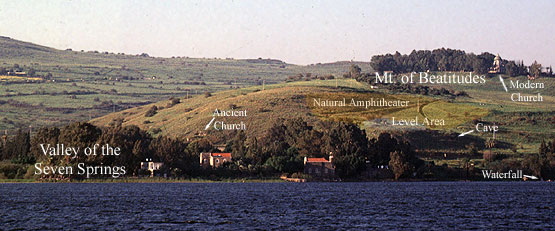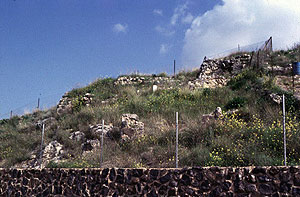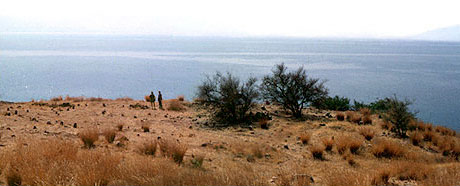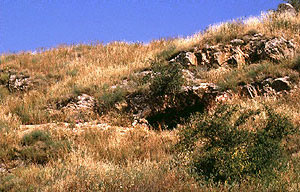The Spirit of the Law
The Sermon on the Mount
by Jeffrey J. Harrison
Several events in the ministry of Jesus are associated with a small green valley in the northwest corner of the Sea of Galilee. Known as Heptapegon (Seven Springs
in Greek, Tabgha for short), its name refers to a group of springs that bubble out of the ground there. Thanks to these springs, the valley stays green in the summer, even when the grass on the surrounding hills dries to a tannish color. The runoff from this area makes a small waterfall that drops into the Sea of Galilee. This would be a convenient place for fishermen to clean their nets after a night of fishing. Perhaps it was here that Jesus called several of his fishermen friends to be his disciples (Matt. 4:18-22).

Directly above this little waterfall rises a low hill with a small cave in its side. The cave is barely large enough for a handful of people to sit out of the heat of the sun. The Christian pilgrim Egeria, who visited the area in the late 4th century, identified this hill, marked by a cave, as the site of Jesus’ Sermon on the Mount (Matt. 5-7).*
* This is the earliest known identification of the site. Near the Seven Springs.... On the hill nearby there is a grotto on top of which the Savior preached the Beatitudes.
The Pilgrimage of Egeria (Peregrinatio Egeriaeas), from a passage preserved in the 12th cent. account of Peter the Deacon, De Locis Sanctis.
Above the cave, the hill flattens out into a small level area (marked Level Area
in the picture above), behind which the land rises steeply again, creating a natural amphitheater (marked Natural Amphitheater
).* Beyond this, the hill continues to rise toward the modern Church of the Beatitudes above (Modern Church
). In this natural amphitheater, as many as 5,000 people could sit and listen to Jesus’ message. Behind him, as a backdrop, they had a peaceful view of the Sea of Galilee.

* This level area may be the level place
mentioned in Luke 6:17. If so, Jesus’ Sermon on the Plain in Luke 6 may be another account of the same sermon. The original Byzantine chapel at the site (5th cent. AD) was located beside this level area, not at the site of the modern church much further up the hill. You can still see the ruins of the Byzantine chapel sticking up above the grass (see Ancient Church
in the photo above). The accuracy of its location is strengthened by the fact that there were still Jewish Christians living in nearby Capernaum at the time the chapel was built. They undoubtedly preserved an accurate memory of the location of Jesus’ sermon.
In his teaching, Jesus laid out the legal foundation of his Messianic kingdom: You have heard [in the Law of Moses].... But I say to you....
By enacting this new Messianic Law, Jesus identified himself as the Prophet-like-Moses of Deuteronomy 18.* As Peter later proclaimed on the day of Pentecost: Moses said,
(Acts 3:22, quoting Deut. 18:18-19; see The Prophet like Moses). That prophet is Jesus. His teachings are the instructions we must obey.The Lord your God will raise up for you a prophet like me from your brothers; you will listen to him in all that he will say to you. But it will be that every soul that will not listen to that prophet will be completely cut off from the people
* The Law of the Messiah, though unfamiliar to many Christians, is mentioned repeatedly in the New Testament, and by many different names: the Law of Messiah (Law of Christ,
Gal. 6:2, 1 Cor. 9:21), the Law written in their hearts
(Rom. 2:15, in reference to the prophecy of Jer. 31:33), the Law of the Spirit of life in Messiah Jesus
(Rom. 8:2), the Law of faith
(Rom. 3:27), the royal Law
(James 2:8), the Law of liberty
(James 1:25, 2:12), the commandment of the Lord
(2 Pet. 3:2), the holy commandment
(2 Pet. 2:21), the commandment
(1 Tim. 6:14), his commandments
(1 John 2:3, 2 John 1:6), my commandments
(by Jesus, John 14:15,21; 15:10).

The intensity of Jewish anticipation of the Prophet like Moses can be seen in the embassy of priests and Levites from Jerusalem that came to question John the Baptist. They asked him, Are you the Prophet?
that is, are you the Prophet like Moses (John 1:21). This is also the meaning of Philip’s words to Nathanael: We have found him of whom Moses wrote in the Law
(John 1:45, see also John 1:25). The reaction people had to the feeding of the five thousand also points to this hope: This is truly the Prophet who is to come into the world
(John 6:14, see also John 7:40).
The importance of Jesus’ Messianic Law, as with the Law of Moses, is difficult for many Christians to grasp today with our generally negative view of religious law. But just imagine if you lived in the time of Moses, or of Jesus, in a world filled with pagan religions. It was common in those religions, if you needed something from your god, to make an offering of, say, a pair of sheep. But how would you know if your pair of sheep was enough to gain the god’s favor? Maybe giving only two sheep would be an insult to the god. So perhaps it would be better to give four sheep, or six, or eight, or...? There was no way to know what would be enough to gain the favor of your god.
This was, and still is, the predicament of pagan religion, and in fact of man-made religion in general. As the prophet Micah put it, With what will I go before the Lord?.... Is the Lord pleased with thousands of rams, with tens of thousands of rivers of oil? Will I give my first-born for my sin, the fruit of my body for the sin of my soul?
(Micah 6:6-7). What is enough? Thousands of animals, rivers of oil? Human sacrifice? You can never be sure when or if your god will bless you, or if he or she might suddenly turn around and destroy you.* Even today, this lack of assurance leads people to extremes in religion. In some parts of the world, they pierce their bodies with huge pins. In others they walk across hot coals. In others they whip themselves to draw blood. In others they become suicide bombers. All these and thousands of other religious actions are designed to get the attention of the gods (or God), who otherwise, they think, might not notice them at all.
* There are many episodes in Greek pagan literature where worshippers were let down or even deceived by their gods. One of the more famous is the request by King Croesus for direction from the oracle of Apollo at Delphi. After presenting a number of lavish gifts, he was encouraged to attack the Persians with a prophecy that he would defeat a great empire (Herodotus, Histories 1.53). As it turned out, the empire that was defeated was his own. The pagan gods were generally seen to be distant and not very concerned with daily human life. The same can be said of the modern semi-secular relics of pagan religion: fate, luck, and the stars (astrology).

But through Moses, God did something radically new: he made a detailed, written agreement with his people, something no god had ever done before. In this agreement, he promised to be Israel’s God and that they would be his special people (Exo. 19:5-6). They didn’t have to worry if he would pay attention to their needs or not: he promised to care for them always. And he gave them specific instructions for what he expected in return, in behavior as well as in offerings. Even if you violated this agreement, there was a built-in mechanism by which you could be restored: the sacrificial system.* Now there was no more religious uncertainty. There was no more wondering if your offering was adequate. You knew exactly what God wanted, and that if you kept within the agreement, he would take care of you. What a relief! No wonder the Israelites were so quick to accept this agreement (Exo. 19:7-8).
* The sacrificial system, however, only provided for inadvertent or unwilling violations (Num. 15:30-31). Willful violation was punished by being cut off
from God’s people (karet), which according to some rabbinical authorities meant an early death and punishment in the world to come. The early Jewish Christians had a similar view: that willful sin could not be atoned and led to judgment (Heb. 10:26-27).
This is why the Law was and still is today considered something good by religious Jews. It’s the basis of their special relationship with God. When religious Jews mention the Torah (the Law of Moses), it gives them a warm, positive feeling, much like Christians get when they talk about the Word of God. It’s God’s communication to them, his instructions for enjoying a special relationship with him.
By the time of Jesus, though, many things in the Law of Moses had become unclear. There were abuses and misunderstandings.* And so people were looking for the Prophet like Moses to clarify the requirements of the Law. This was the purpose of Jesus’ Sermon on the Mount: to bring the observance of the Law back into harmony with God’s original intentions. He did this by laying out a new, updated version of the Law, the Law of the Messianic kingdom.**
* Including the deception of legalism, in which many sought to establish their own personal righteousness by works of the law, something that is completely at odds with the original spirit of the Mosaic covenant.
** Though the Law of Moses was given only to Israel (Exo. 19:3,6, 20:22, 25:22, 34:27; Deut. 1:3, 4:1, 4:44-45, etc.), the Law of Messiah applies to those of every nation who accept Jesus as Messiah (Col. 1:28, Rev. 22:12; see The Laws of Noah).
In introducing his message, Jesus made it clear that he did not come to do away with the Law of Moses: Do not suppose that I came to abolish the Law or the Prophets;* I did not come to abolish, but to fill them
(plerosai in Greek, Matt. 5:17). Rather than replacing the Law, Jesus’ teaching brings the Law of Moses to its fullness
—its full meaning. This is a Hebrew idiom implying both having a right understanding of the Law and properly fulfilling its requirements.
* The Law and the Prophets
is the Jewish name for the Hebrew Bible (the Old Testament): in Hebrew, Torah, Nevi’im, v’Ketuvim (the Law, Prophets, and Writings), often abbreviated Tanakh.
To emphasize the point, Jesus underlines the ongoing validity of the Law: For amen I say to you, until the heaven and the earth pass away, a single iota [the smallest letter] or a single stroke [used in writing] will certainly not pass away from the Law until all comes to pass
(Matt. 5:18). In this devotion even to the individual written letters of the Bible, Jesus reflects the views of his contemporaries and of later rabbis, whose teachings often turned on the slightest detail of the written text of the Bible.
Rather than replacing the Law of Moses, the new Law of Messiah is in continuity with it: Whoever, therefore, looses* one of the least of these commandments, and teaches the people in this manner, will be called the least in the kingdom of the heavens;** but he who obeys and teaches it [even the least commandment], this one will be called great in the kingdom of the heavens
(Matt. 5:19). If you want to be great in the kingdom of God and of his Messiah, Jesus says, you must also teach and obey the commandments of the Law of Moses!***
* Binding and loosing (אסור והתיר, asur v’hittir) is a rabbinic idiom referring to forbidding and permitting (or enforcing and relaxing legal obligations; see Matt. 16:19, 18:18; Josephus, Wars 1.5.2).
** The kingdom of the heavens
is a respectful Jewish way of saying the kingdom of God. God’s name, even his title, was considered too holy to mention, so substitutes were used, such as Heaven (Matt. 21:25, Mark 11:30-31), Glory (2 Pet. 1:17), Power (Matt. 26:64), or the Most High (Luke 1:32,35,76; 6:35). Today the Name
is a popular substitute, as in the expression Baruch Ha-Shem, Blessed be the Name.
For the same reason, many religious Jews write the word God
in English as G-d.
*** This obedience requires great care in distinguishing to whom a particular commandment is given. Most provisions of the Law of Moses are directed exclusively to the Jewish people (the natives
[the אֶזְרָח ezrach] among the people; Exo. 12:19,48, etc.). To assume incorrectly that a particular commandment must also be obeyed by Gentile Christians is a misunderstanding and can become a violation of the Law—the ancient heresy of Judaizing.
Only those commandments directed to Gentiles (the strangers
or sojourners
[the גֵּר ger] among the people; Lev. 16:29, 17:10, etc.) are required of Gentile Christians. These laws are repeated in the New Testament—the Law of Messiah—which is required of both Jewish and Gentile believers. But they exclude most of the ceremonial law, the laws of sacrifice, and the food laws which are unique to God’s covenant with Israel. For a more complete discussion of these crucial distinctions, see The Laws of Noah, our seminar on The Jewish Roots of Christianity (part 1), or our book on The Jewish Roots of Christianity.
Jesus himself proceeds to do just that, starting with the commandment against murder (Matt. 5:21, quoting Ex. 20:13). But the interpretation Jesus gives this commandment goes far beyond the usual understanding. For not only does he say that the action of murder itself merits punishment; getting angry with your brother merits an equal punishment. Even worse is calling your brother a name in anger, such as raca (empty-headed) or you fool
(Matt. 5:22).*
* The punishment merited for calling someone raca is, Jesus says, to appear before the Sanhedrin Council, the highest court of the Jewish people, which judged crimes of the greatest severity. The punishment for calling your brother a fool
is to be sent to the Gehenna of fire
(literally in Greek). This is the equivalent of the lake of fire in Rev. 20:15, the place of eternal physical punishment.
An example of the use of these disparaging names can be found in a story from the generation before Jesus. One of the rabbis* met a group of farmers who were going to sell their wheat for a certain price. Later, he met another group of farmers going to sell their wheat for a higher price. When he asked the second group why its price was higher, they said, You stupid Babylonian, do you not know the rule—according to the labor, so is the reward? And we have brought the wheat from a greater distance, so our price is higher.
The rabbi replied to them, You foolish, empty-headed people (raca)! I ask you a civil question and you answer me rudely!
**
* This was the famous rabbi Hillel, originally from Babylonia, which explains the response of the second group of farmers.
** Judah Nadich, The Legends of the Rabbis, vol. 1, p. 204. For other examples of the use of raca see Ta’an 20b, BK 50b, and BB 75a in the Babylonian Talmud.
Jesus’ teaching implies that this rabbi and those like him were missing the point of God’s Law. They were obeying the letter of the Law by avoiding murder. But they were disobeying the spirit of the Law by getting angry at their fellow man. Here, as in many of his other teachings, Jesus is concerned not just with our outward behavior, but with the condition of our hearts. Getting angry with your neighbor is also a sin, since these angry feelings are what lead to murder and war and many other kinds of violence. This can be seen in the Middle East today. Palestinian youth don’t just wake up one day and suddenly decide to attack Israeli soldiers. First they are taught, as children, to hate and be angry with Israelis, a message reinforced over many years. Only then are they willing to give their lives to suicide attacks. And so it goes in many other places and in many other conflicts around the world.
It all starts with an angry thought. Jesus’ solution is to reject angry thoughts just as firmly as we reject murder itself—even if there are legitimate grounds for our anger. As he says a few verses later, you should not only love your neighbor
(Matt. 5:43, quoting Lev. 19:18), but should even love your enemies
(Matt. 5:44). This, he teaches, is the fullness
of the Law, the true spirit of the Law of Moses.
As usual, Jesus takes the point and pushes it even further: Not only should we avoid becoming angry ourselves, we should also go to great lengths to keep our brother from being angry with us (Matt. 5:23-24). Jesus uses the example of a person presenting an offering in the Temple, who then suddenly realizes that his brother has something against him. What does he advise? Leave your offering there before the altar, and first go make peace with your brother, and then come bring your offering
(Matt. 5:24). This could take several days, if not weeks of travel and considerable expense. But Jesus makes it a higher priority than even to worship God. Why? Because as John the apostle put it many years later: If anyone says,
(1 John 4:20). By hating our brother, we become disobedient to God. This is the I love God,
and hates his brother, he is a liar; for the one who does not love his brother whom he has seen is not able to love God whom he has not seenfull
meaning of the commandment against murder. Right actions, without the right attitude, miss the point of God’s Law.
Next, Jesus mentions the commandment against adultery (Matt. 5:27, quoting Exo. 20:14). The letter of the Law says that you must not commit the act of adultery. But, Jesus says, the true spirit of the Law is that you must not even look with lust (Matt. 5:28). Jesus wasn’t the first to teach this implication of the Law of Moses. The Book of Jubilees, written a century or so before the time of Jesus, says, See that no woman commits sexual immorality with her eyes or her heart
(Jub. 20:4). Physical immorality starts with inner or spiritual immorality. And both are just as displeasing to God. Whether it’s thoughts that rise up in our minds, or ideas or images that come in from the outside, how can we entertain such thoughts and be right with God? The Psalmist says, I will put no worthless thing before my eyes
(Psa. 101:4). We must guard not only our bodies, but also our eyes and our hearts.
To show how serious an offense this is, Jesus continued with the radical teaching, If your right eye causes you to sin, tear it out and throw it away from you: for it is better for you that one of the parts of your body be destroyed than that your whole body be thrown into Gehenna
(in Greek, Matt. 5:29). The lust of the eye, in other words, is such an extreme offense that it merits a traumatic, permanent injury to our bodies in order to stop it. This puts things into proper perspective. We tend to give top priority to health along with professional achievement and material acquisition. But God puts top priority on personal holiness: both in how we think as well as how we act toward others.
This is the true meaning of the Law of Moses: not only that we control our bodies, but that we also control our minds—our inner life—and bring both under the leading of the Holy Spirit. As the apostle Paul put it, we are taking every thought captive to the obedience of Messiah
(2 Cor. 10:5). The Law of Moses emphasizes outer conduct. But the Law of Messiah reveals God’s deeper intentions, emphasizing the inner life of the spirit, while it continues to affirm the obedience of the flesh. The Law of Moses is weak because of the weakness of the flesh (Rom. 8:3). But the new Law of Messiah releases the Holy Spirit into our lives, through whose power we are able to fulfill the requirement of the Law of Moses (Rom. 8:4).